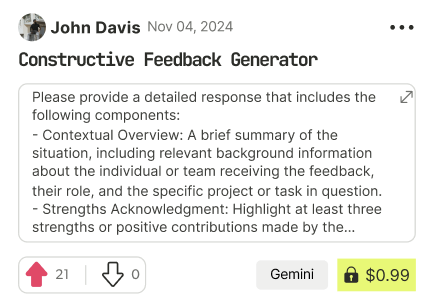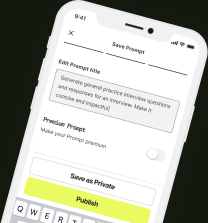prompt mine App
Find, Create & Share AI Magic
Daily Routine to Optimize Sleep Quality: Pre-Bedtime Habits, Relaxation Techniques, and Dietary Adjustments
Okay, let's craft a personalized daily routine to optimize your sleep quality. This will be a comprehensive approach, so be patient with yourself as you implement these changes. It takes time for your body to adjust to a new rhythm.
**Important Note:** If you have underlying medical conditions (like insomnia, sleep apnea, or anxiety), or are taking medication, please consult with your doctor before making significant changes to your routine. This guide is for general improvement and isn't a substitute for professional medical advice.
**Our Goal:** Consistent, restorative sleep that leaves you feeling refreshed and energized each day.
**Here's the comprehensive daily routine:**
**Morning (Wake-Up to Mid-Morning):**
* **7:00 AM - Consistent Wake-Up Time (Even on Weekends):** This is the foundation of a healthy sleep schedule. Even if you didn't sleep well, try to wake up around the same time. This helps regulate your body's natural circadian rhythm. Set an alarm and resist the urge to snooze. Snoozing disrupts your sleep cycle.
* **7:05 AM - Bright Light Exposure:** Open your curtains immediately, go outside for a few minutes, or use a bright light therapy lamp (10,000 lux) for 20-30 minutes. Light suppresses melatonin and signals to your brain that it's time to be awake.
* **7:30 AM - Hydration and Breakfast:** Drink a glass of water upon waking to rehydrate. Eat a balanced breakfast with protein, healthy fats, and complex carbohydrates. Examples: Oatmeal with berries and nuts, scrambled eggs with whole-wheat toast and avocado, or a Greek yogurt bowl with fruit and granola. Avoid sugary cereals and processed foods.
* **8:00 AM - Physical Activity (Morning is Ideal):** Engage in at least 30 minutes of moderate-intensity exercise. This could be a brisk walk, jog, yoga, swimming, or cycling. Exercise helps regulate your sleep-wake cycle. **Avoid intense exercise close to bedtime.**
* **9:00 AM - Morning Productivity:** Dedicate this time to your most demanding tasks. A well-structured morning can reduce stress and improve overall sleep quality.
**Afternoon (Mid-Day to Late Afternoon):**
* **12:00 PM - Lunch:** Have a balanced lunch, similar to breakfast. Avoid heavy, greasy meals that can cause sluggishness. Include protein and fiber to sustain energy levels throughout the afternoon.
* **1:00 PM - Afternoon Sunshine Break:** If possible, get another dose of sunlight. Even a 10-15 minute walk outdoors can be beneficial.
* **2:00 PM - Limit Caffeine Intake:** Cut off caffeine consumption (coffee, tea, energy drinks, soda, chocolate) no later than 2:00 PM, or even earlier if you are sensitive to it. Caffeine has a long half-life and can disrupt sleep even if consumed in the afternoon.
* **3:00 PM - Afternoon Activity:** Consider doing some lighter exercises or stretches. A change of scenery and a break from desk work can increase alertness.
* **4:00 PM - Manage Stress:** Practice stress-reducing activities such as meditation, deep breathing exercises, or hobbies like reading or painting.
**Evening (Late Afternoon to Pre-Bedtime):**
* **6:00 PM - Dinner:** Eat dinner at least 2-3 hours before bedtime. Avoid large, heavy, or spicy meals that can cause indigestion. Opt for easily digestible foods like lean protein, vegetables, and whole grains. A small portion of complex carbohydrates may help with melatonin production.
* **7:00 PM - Wind-Down Time:** Begin your pre-bedtime routine. This is crucial for signaling to your brain that it's time to prepare for sleep.
* **7:30 PM - Dim the Lights:** Start dimming the lights in your home. Use lamps with warm-toned bulbs (lower Kelvin rating) instead of bright overhead lights. This encourages melatonin production.
* **8:00 PM - Digital Detox:** Stop using electronic devices (phones, tablets, computers, TVs) at least 1-2 hours before bedtime. The blue light emitted from screens suppresses melatonin and stimulates the brain. If you must use screens, use blue light filters (built-in or apps like f.lux).
* **8:30 PM - Relaxing Activities:** Engage in calming activities that don't involve screens. Examples include:
* Reading a physical book (not on a device)
* Taking a warm bath or shower (this helps lower your core body temperature, signaling sleep)
* Listening to calming music or a podcast
* Gentle stretching or yoga
* Journaling or writing in a gratitude journal
* Spending quality time with loved ones in a relaxing environment.
* **9:00 PM - Prepare Your Sleep Environment:**
* **Bedroom Temperature:** Ensure your bedroom is cool (around 65-68°F or 18-20°C). A cooler temperature promotes better sleep.
* **Darkness:** Make sure your room is completely dark. Use blackout curtains or an eye mask to block out any light.
* **Quiet:** Minimize noise. Use earplugs, a white noise machine, or a fan to mask distracting sounds.
* **Comfortable Bedding:** Make sure your mattress, pillows, and sheets are comfortable and supportive.
**Bedtime (Immediately Before Sleep):**
* **9:30 PM - Relaxation Techniques:**
* **Deep Breathing:** Practice deep, slow breathing exercises. Inhale deeply through your nose, hold for a few seconds, and exhale slowly through your mouth. Repeat for 5-10 minutes. 4-7-8 breathing is great.
* **Progressive Muscle Relaxation:** Tense and then relax different muscle groups in your body, starting with your toes and working your way up to your head.
* **Meditation or Mindfulness:** Focus on your breath or a guided meditation app to quiet your mind.
* **9:45 PM - Final Preparations:** Brush your teeth, wash your face, and get into comfortable pajamas.
* **10:00 PM - In Bed:** Go to bed at the same time every night, even on weekends. This reinforces your body's natural sleep-wake cycle.
* **If You Can't Fall Asleep:** If you're lying in bed awake for more than 20 minutes, get out of bed. Go to another room and do a relaxing activity (reading, listening to music) until you feel sleepy, then return to bed. Avoid looking at your phone or watching TV.
**Dietary Adjustments:**
* **Limit Alcohol:** While alcohol may initially make you feel sleepy, it disrupts sleep later in the night. Avoid alcohol close to bedtime.
* **Avoid Large Meals Before Bed:** As mentioned earlier, heavy meals can cause indigestion and disrupt sleep.
* **Hydration:** Stay hydrated throughout the day, but avoid drinking large amounts of fluids before bed to minimize nighttime awakenings.
* **Magnesium-Rich Foods:** Magnesium can promote relaxation and sleep. Include foods like leafy greens, nuts, seeds, and whole grains in your diet. You can also talk to your doctor about a magnesium supplement.
* **Tryptophan-Rich Foods:** Tryptophan is an amino acid that can be converted to serotonin and melatonin. Foods like turkey, chicken, fish, eggs, and dairy products contain tryptophan. A small snack containing these foods may be helpful.
**Troubleshooting and Adjustments:**
* **Track Your Sleep:** Keep a sleep diary to track your sleep patterns, including bedtime, wake-up time, sleep duration, and any factors that may be affecting your sleep (e.g., caffeine intake, stress levels).
* **Be Consistent:** Consistency is key! Stick to your routine as much as possible, even on weekends.
* **Adjust as Needed:** This is a starting point. Experiment with different relaxation techniques, bedtime routines, and dietary adjustments to find what works best for you.
* **Don't Get Discouraged:** It takes time to establish a healthy sleep routine. Be patient with yourself and don't give up if you don't see results immediately.
* **Consider a Sleep Study:** If you suspect you may have a sleep disorder (like sleep apnea), talk to your doctor about getting a sleep study.
**Key Principles to Remember:**
* **Circadian Rhythm:** Respect your body's natural sleep-wake cycle.
* **Sleep Hygiene:** Create a conducive sleep environment.
* **Relaxation:** Reduce stress and promote relaxation before bed.
* **Consistency:** Maintain a consistent sleep schedule.
By implementing these strategies, you'll be well on your way to achieving better sleep quality and waking up feeling refreshed and ready to tackle the day! Good luck! Let me know if you have any specific questions as you work through this routine.

Find Powerful AI Prompts
Discover, create, and customize prompts with different models, from ChatGPT to Gemini in seconds

Simple Yet Powerful
Start with an idea and use expert prompts to bring your vision to life!

